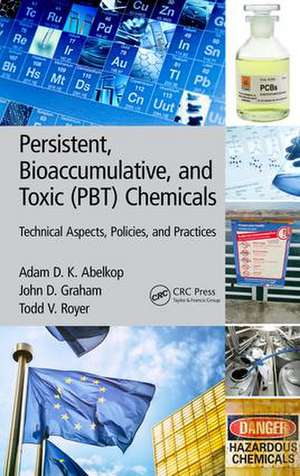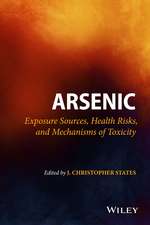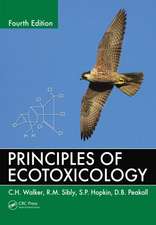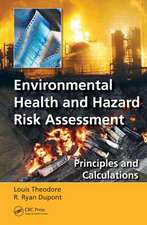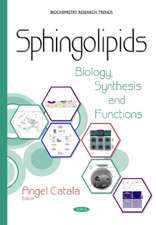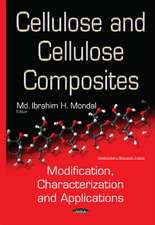Persistent, Bioaccumulative, and Toxic (PBT) Chemicals: Technical Aspects, Policies, and Practices
Autor Adam D. K. Abelkop, John D. Graham, Todd V. Royeren Limba Engleză Hardback – 3 aug 2015
It includes case studies of specific chemicals, provides an introduction to the overall subject of toxic chemicals, and weighs in on science and policy expansion for PBTs. It also provides summary tables of important PBTs, and discussions on the number of PBTs in commerce, weight of evidence approaches, market deselection, and international management.
The text:
- Assesses the history, current practice, and future of PBT management
- Considers the roles scientific data, modeling, and conventions play in identifying and regulating PBTs
- Explores the number of PBTs in commerce and the growing role of weight of evidence (WOE) in the making of PBT determinations
- Identifies issues that are likely to come up in WOE judgments
- Examines international, national, subnational, and regional PBT policies
- Includes a comprehensive and easy-to-understand analysis of PBT science and policy
| Toate formatele și edițiile | Preț | Express |
|---|---|---|
| Paperback (1) | 370.25 lei 6-8 săpt. | |
| CRC Press – 26 iul 2017 | 370.25 lei 6-8 săpt. | |
| Hardback (1) | 710.59 lei 6-8 săpt. | |
| CRC Press – 3 aug 2015 | 710.59 lei 6-8 săpt. |
Preț: 710.59 lei
Preț vechi: 953.25 lei
-25% Nou
Puncte Express: 1066
Preț estimativ în valută:
135.99€ • 141.45$ • 112.27£
135.99€ • 141.45$ • 112.27£
Carte tipărită la comandă
Livrare economică 14-28 aprilie
Preluare comenzi: 021 569.72.76
Specificații
ISBN-13: 9781482298772
ISBN-10: 1482298775
Pagini: 303
Ilustrații: 3 black & white illustrations, 10 black & white tables
Dimensiuni: 156 x 234 x 20 mm
Greutate: 0.57 kg
Ediția:1
Editura: CRC Press
Colecția CRC Press
ISBN-10: 1482298775
Pagini: 303
Ilustrații: 3 black & white illustrations, 10 black & white tables
Dimensiuni: 156 x 234 x 20 mm
Greutate: 0.57 kg
Ediția:1
Editura: CRC Press
Colecția CRC Press
Cuprins
The challenge of identifying, assessing, and regulating PBTs. PBT determinations: Science and standard procedures. PBT determinations: Weight of evidence approaches and the number of PBTs in commerce. International and regional PBT policies. National PBT policies in Asia and North America. Subnational and private sector PBT policies. PBT determinations and policies: Findings and recommendations.
Notă biografică
Adam D.K. Abelkop is an associate instructor at the School of Public and Environmental Affairs and a doctoral candidate in Indiana University’s Joint PhD in Public Policy program administered by School of Public and Environmental Affairs and the Department of Political Science. He earned his law degree from the University of Iowa College of Law and completed his undergraduate studies at Wake Forest University. His research focuses on the ways in which scientific and socioeconomic information are incorporated into judicial decision making, as well as risk regulation for environmental and public health protection.
John D. Graham is dean of the School of Public and Environmental Affairs. He earned his undergraduate degree from Wake Forest University, his MA in public policy from Duke University, and his PhD in urban and public affairs from Carnegie-Mellon University. He joined the faculty of the Harvard School of Public Health in 1985 and served as the founding director of the School’s Center for Risk Analysis from 1989 to 2001. Dr. Graham’s research focuses on risk-based decision making. He is the author or coauthor of more than 10 books and more than 200 academic papers.
Todd V. Royer is an associate professor in the School of Public and Environmental Affairs at Indiana University. Dr. Royer holds degrees in ecology from Iowa State University and Idaho State University and was a postdoctoral researcher at the University of Illinois at Urbana-Champaign from 2000 to 2003. His research is aimed at understanding how biogeochemical and ecological factors, including human activities, interact to affect water quality and ecosystem functioning in freshwater systems.
John D. Graham is dean of the School of Public and Environmental Affairs. He earned his undergraduate degree from Wake Forest University, his MA in public policy from Duke University, and his PhD in urban and public affairs from Carnegie-Mellon University. He joined the faculty of the Harvard School of Public Health in 1985 and served as the founding director of the School’s Center for Risk Analysis from 1989 to 2001. Dr. Graham’s research focuses on risk-based decision making. He is the author or coauthor of more than 10 books and more than 200 academic papers.
Todd V. Royer is an associate professor in the School of Public and Environmental Affairs at Indiana University. Dr. Royer holds degrees in ecology from Iowa State University and Idaho State University and was a postdoctoral researcher at the University of Illinois at Urbana-Champaign from 2000 to 2003. His research is aimed at understanding how biogeochemical and ecological factors, including human activities, interact to affect water quality and ecosystem functioning in freshwater systems.
Recenzii
"… an essential tool for policymakers and practitioners concerned with chemical management policy in the 21st century. It is the best available handbook explaining the history of PBT principles and the current state of regulatory approaches to the subject. It further provides a clear and comprehensive picture of the scientific and policy issues that warrant attention by all parties involved in chemical management matters."
—Mark Greenwood, Greenwood Environmental Counsel
"This text provides a comparative analysis of regulatory experience in considering persistence, bioaccumulation and associated toxicity in prioritization and risk assessment of industrial chemicals, based on input from a broad range of sources. As a result, it provides highly relevant and recommended background reading for those considering options to address the essential need to more efficiently prioritize, assess and manage much larger numbers of existing industrial chemicals."
—M.E. (Bette) Meek, Associate Director, Chemical Risk Assessment, McLaughlin Centre for Risk Science, Faculty of Medicine, University of Ottawa
"Many countries are increasingly concerned about pollution problems caused by chemicals that are "persistent, bioaccumulative, and toxic" (PBT). Despite international alarm about these chemicals, there is little unanimity about how to regulate or identify them. This book by Abelkop, Graham, and Royer (all, Indiana Univ.) explores the various definitions, methods of analysis, and regulatory policies currently used in the effort to minimize the damage that PBT chemicals may cause. The situation is complicated because different nations analyze and regulate these compounds differently, and there may even be important differences within the subdivisions of individual countries. For example, China, which has become a major chemical producer, has far fewer well-developed policies than the US or the European Union, and some US states have local regulations that differ from national standards. In order to reconcile these various requirements, it will first be necessary to identify how they differ. This book is a valuable step in that direction. It is is well written and thorough but provides a level of detail that will be most useful to advanced-level students and professionals. Thus, it is mainly recommended for libraries that support graduate programs in environmental studies"
—CHOICE, June 2016
—Mark Greenwood, Greenwood Environmental Counsel
"This text provides a comparative analysis of regulatory experience in considering persistence, bioaccumulation and associated toxicity in prioritization and risk assessment of industrial chemicals, based on input from a broad range of sources. As a result, it provides highly relevant and recommended background reading for those considering options to address the essential need to more efficiently prioritize, assess and manage much larger numbers of existing industrial chemicals."
—M.E. (Bette) Meek, Associate Director, Chemical Risk Assessment, McLaughlin Centre for Risk Science, Faculty of Medicine, University of Ottawa
"Many countries are increasingly concerned about pollution problems caused by chemicals that are "persistent, bioaccumulative, and toxic" (PBT). Despite international alarm about these chemicals, there is little unanimity about how to regulate or identify them. This book by Abelkop, Graham, and Royer (all, Indiana Univ.) explores the various definitions, methods of analysis, and regulatory policies currently used in the effort to minimize the damage that PBT chemicals may cause. The situation is complicated because different nations analyze and regulate these compounds differently, and there may even be important differences within the subdivisions of individual countries. For example, China, which has become a major chemical producer, has far fewer well-developed policies than the US or the European Union, and some US states have local regulations that differ from national standards. In order to reconcile these various requirements, it will first be necessary to identify how they differ. This book is a valuable step in that direction. It is is well written and thorough but provides a level of detail that will be most useful to advanced-level students and professionals. Thus, it is mainly recommended for libraries that support graduate programs in environmental studies"
—CHOICE, June 2016
Descriere
The basic purpose for identifying persistent, bioaccumulative, and toxic chemicals (PBTs) is to assist government and industry in taking rational protective steps for public health, safety, and the environment. This book builds on a report prepared by an international team to evaluate how PBTs are currently identified and managed in Asia, Europe, and North America. It provides recommendations for improving those processes. The concept of PBTs has been an increasingly important component in national and international efforts to assess and manage toxic chemicals.
